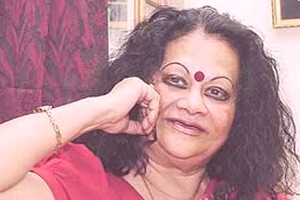Mamoni Raisom Goswami
Mamoni Raisom Goswami (1942 – 2011) is one of the most famous literary figures in Assam. She was well-known as a writer, editor, scholar, professor and a social activist. Her real name was Indira Goswami. But, people in Assam used to call her as “Mamoni Baideo” (elder sister Mamoni). During her lifetime, Indira Goswami was known for her magnificent literary works, Ramayana studies and various social activities. Mamoni Raisom Goswami was also a winner of both Sahitya Akademi (1982) and Jnanpith Award (2000).

Mamoni Raisom Goswami
Life and Work:
Born in Guwahati (14 November, 1942), Mamoni Raisom Goswami studied at Latashil Primary School, Guwahati; Pine Mount School, Shillong; and Tarini Charan Girls’ School, Guwahati and Handique Girls’ College, Guwahati. She graduated from Cotton College, Guwahati in Assamese literature and also earned a Master’s degree from Gauhati University in the same subject.
After working at Sainik School, Goalpar, Mamoni Raisom Goswami went to Vrindavan, Uttar Pradesh, for Ramayana studies. Later she joined University of Delhi as the Head of Assamese department. After suffering a long ailment, Mamoni Raisom Goswami passed away on 29th November, 2011.
Mamoni Raisom Goswami is one of the prominent figures in contemporary Assamese literature. Some of her well-known works include Ahiron, Chinnamastar Manuhto (The Man from Chinnamasta), Datal Hantir Une Khowa Howdah (The Moth Eaten Howdah of a Tusker), Mamore Dhora Tarowal, Shadow Of The Dark God, Ramayana from Ganga to Brahmaputra, Nilakanthi Braja (The Blue-Necked Braja), Adha lekha Dostabej (An Unfinished Autobiography), and more. In 182, Mamoni Baideo was awarded with Sahitya Akademi for her work: Mamore Dhora Tarowal. She also won Jnanpith Award (2000), one of the most prestigious literary honours in India.
In 2008, Mamoni Raisom Goswami received Principal Prince Claus Award, one of Europe’s most prestigious literary awards. She was honored with the award for the unique quality of her writing, for identifying & expressing the inscription of cultural norms in the body, and for her influential social & cultural activism through literature.
Assams.Info - The Assam Information Portal
